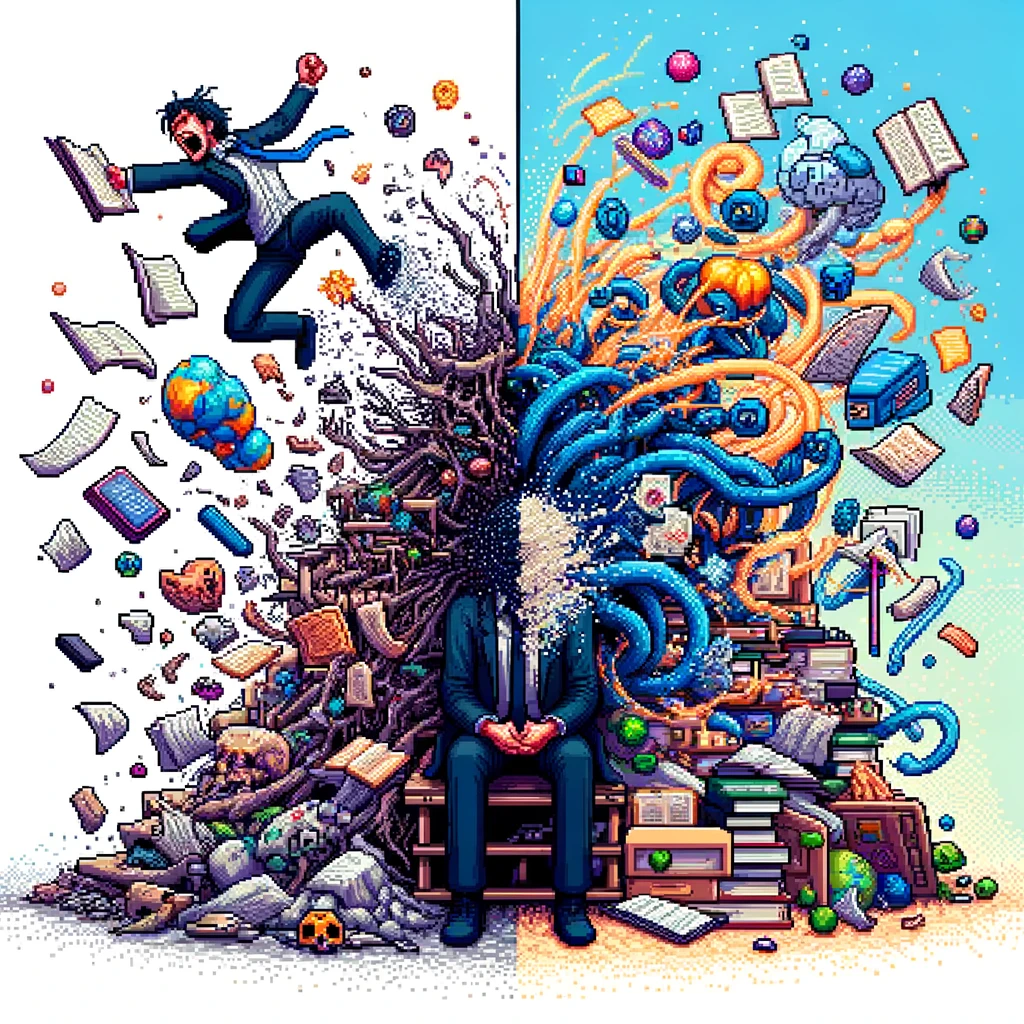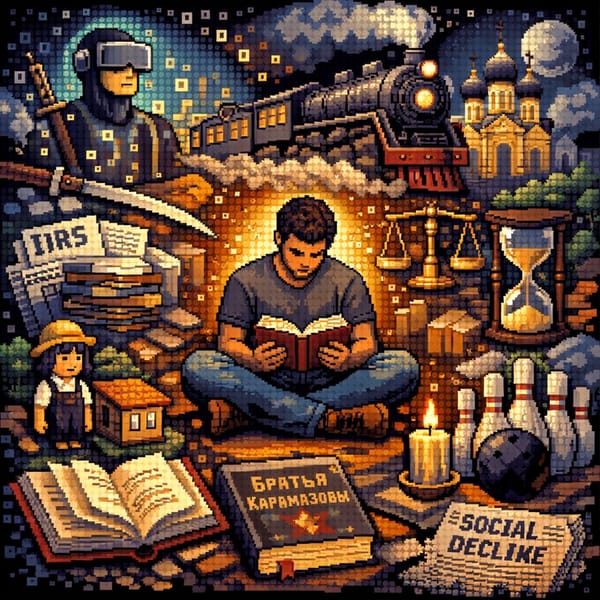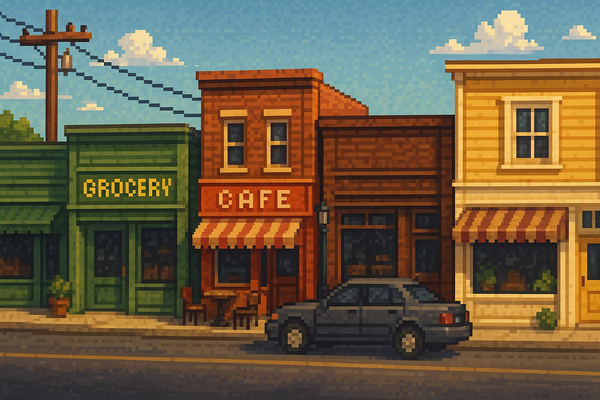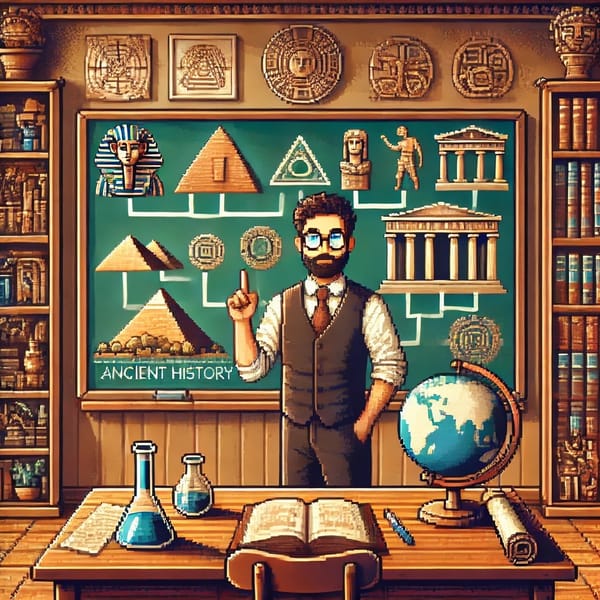Embracing Limits in 2024

I have difficulty accepting limits and have always tried to be everything to everyone. This may happen as you age, or I have just failed enough times to finally admit I have limitations, even if I don't fully accept them. Recently, though, I found constraints to be positive.
A good example. I didn't realize how much I thought about dating and all things related to it until Amy and I got engaged and married. Suddenly, I had 20%[1] more brain capacity than before because I wasn't constantly thinking about finding a spouse.
Another example is when I started writing Daniel Thoughts. Nothing about me changed, but now I am considering how everything I see could fit into the ideas for what I may write next[2].
Neither of these cases physically changed my reality, but because I committed to something, they made my mind view the world differently.
The Problem
One place I need help with limitless options is in what to explore[3]. I am too curious for my own good and can get interested in just about any topic.
Reflecting on the past few years, I think I have an exploration cycle:
- Realizing there are so many things I want to learn.
- Frantically consuming anything and everything. There is no silent moment in my life; I am crushing audiobooks and podcasts and reading every newsletter I subscribe to, even if the topic doesn't seem that interesting.
- Burn out.
- Doing absolutely nothing and finding ways to try and turn my brain off to reduce the overstimulation of the past few weeks of frantic consumption.
- Rinse and repeat.
This is not a great way to live. It is as if I believe if I go fast enough, I will never have to pick learning about one topic over another. I can learn them all.
My Experiment
After sampling this for a few months, I have decided that next year, I will focus my reading on only two topics: design and business strategy. There will be some exceptions here or there since abiding by principles is far better than rules, but I want to stick with this for the most part.
Potential Benefits:
- Clear filter for everything I am reading. "Is this related to design or business strategy?"
- Reorienting the goal around learning instead of getting through books (as Goodreads has aptly trained us to do).
- This provides permission to slow down, take notes, and enjoy the process.
- It also provides permission to give up on a book 1/3 the way through or after skimming through the significant pieces if I have the information I want[4].
- Rather than subjecting it to an algorithm, I am actively deciding what I do or do not do.
- Removing myself from the present. Focusing on foundational works instead of the latest news item.
- Taking the long view. Focus less on moving quickly and more on building mass.
The downsides are having to say no to things I genuinely want to do and being a bit more out of the loop, but those are a price I am willing to pay. Instead of trying to go everywhere quickly and getting nowhere, I can go in one direction for a set amount of time and see where I end up.
Topic Selection
Why Design?
First, I love visually explaining ideas. This was one of my favorite parts of being a consultant, and if you work with me in my current job, you have undoubtedly seen one or two of my expo marker murals. This includes data visualization and visual storytelling (like The Pudding), and I also hope to have visual explanations in Daniel Thoughts via hand drawing in the near future[5].
Second, ever since I read The Design of Everyday Things a few years ago, I have constantly evaluated how well things are designed for humans. There is an intriguing cross-over between psychology, “What are humans good at?” and design, "How can we make this best used by a human?". This can cross over into industrial design, user interface design, architecture, organization design, city planning, and more.
Why Business Strategy?
The real underlying fascination comes from my love of games. Understanding the rules, the players, and where the board sits to try and determine the next best move.
I hate the buzzword nature of studying "Strategy", but it seemed like the best word to use based on some of the books I want to read in the short term. Classics like Blue Ocean Strategy, Competitive Strategy, and The Innovator's Dilemma. Since this relates directly to my work, learning what others have figured out is time well spent. Each framework will be flawed, but these models can be useful.
What didn't make the cut?
The top three contenders on the more fun side were:
- Music / Jazz History - reading biographies of famous jazz musicians + listening to lots of music + playing trumpet
- Food - cooking + cultural studies + eating lots of new places + more hosting
- Games - history + strategy + learning lots of new ones
Even typing out the three above makes me feel a particular desire that I should have selected one of those topics. If I regret it, there is always next year.
Conclusion
Ultimately, the goal for the year is to slow down, and I hope this can get me one step closer. This is all one big experiment and may fail masterfully. Let’s find out.
P.S. If you have any book recommendations relating to design or business strategy, I would love to hear them. I am open to related biographies and novels, too.
- This is precise.
- LibertyRPF compared this phenomenon to what it feels like walking around with a camera around your neck. Everything may be an opportunity.
- This wreaks havoc on my inbox because every newsletter sounds excellent until there are too many to read.
- This is chafing against my personality of completionism.
- Shoutout to Ben Thompson and Tim Urban for their hand-drawn inspiration



